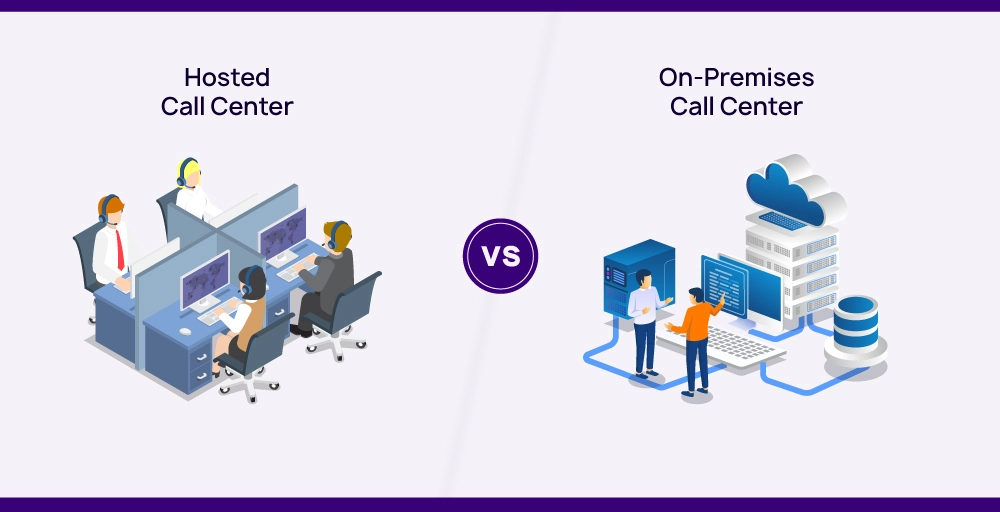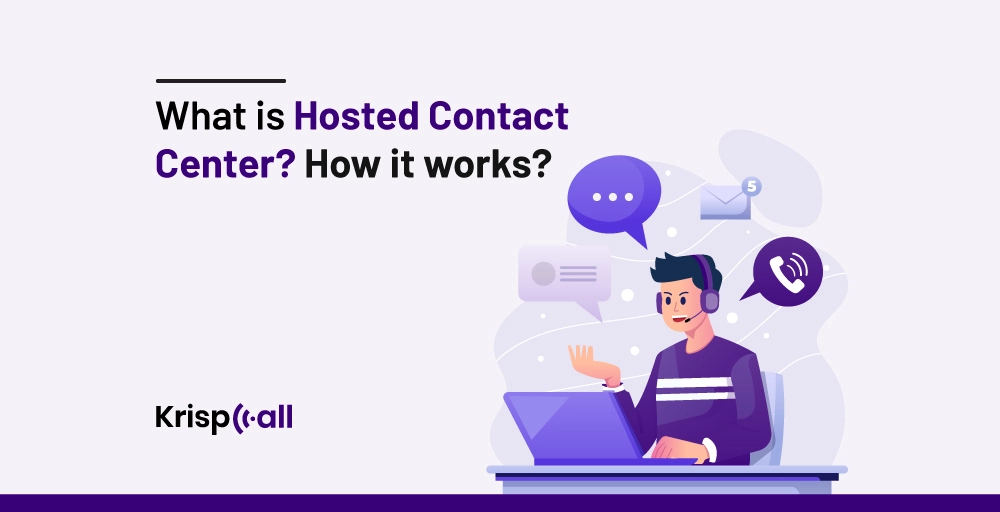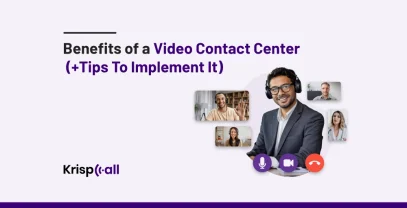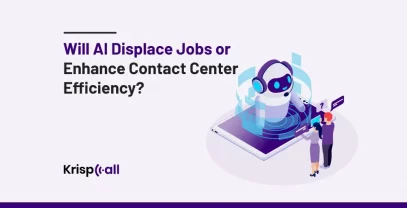Can you Imagine a call center without a physical center? Consider a virtual center that manages all of your customer contacts, including calls, emails, and chats. That’s what a hosted contact center is all about.
According to a survey by a business research company global cloud based contact center is expected to rise by 5.3 billion dollars (22.1%) in 2027.
This shows how many businesses are switching to hosted contact centers to improve customer service.
In this article, we will explore the benefits, advanced capabilities, and things to consider before choosing the right hosted contact center solution.
What is a Hosted Contact Center?
A hosted contact center is a communication software service provided by a third-party provider, which eliminates the requirement to set up hardware and software at your own place. Instead, you use essential contact center tools and features through a safe cloud service.

People usually call hosted contact centers “single-tenant” and cloud contact centers “multi-tenant.” Single tenancy means that only one client uses the software application and its supporting infrastructure at a time. On the other hand, multi-tenancy solutions serve multiple customers, with each customer using only the service they require. These both are slightly difference.
Let’s explore the core differences between these two:
- Hosted Contact Center: It is contact center software or solutions provided by another company, whether stored in regular data or on the internet (cloud).
- Cloud Contact Center: It refers to a contact center solution kept in the cloud. These types of contact centers in the cloud have all the advantages of hosted ones, plus they’re even more accessible to adjust in size, more secure, and easier to access.
How a Hosted Contact Center Works?
The hosted contact center uses cloud-based infrastructure and software to facilitate communication between businesses and their customers. Instead of managing the contact center software and hardware on-site, companies access these resources through a third-party service provider via the Internet.
Here is the step-by-step process:
Cloud Infrastructure: The provider maintains the required network infrastructure, hardware, and software in data centers located in various regions. This infrastructure, with its scalability and resilience, can manage high call, email, chat, and other communication channel traffic.
Multi Channel Support: Numerous communication methods, including voice calls, emails, web chats, SMS, social media, and more, are supported by hosted contact centers. This enables businesses to communicate with clients using the channels of their choice.
Routing and Queuing: Call routing algorithms and automatic call distribution (ACD) software from the provider are used to route incoming calls to available agents. Routing rules consider various aspects, including priority, availability, and expertise.
Agents: As an alternative to traditional desk phones, agents receive and make calls using softphones on their laptops. Agents have access to an interface where they can connect with customers and interact with them through various channels to handle the issue effectively.
Applications: Agents access the contact center software using web browsers. It includes phone controls, chat interfaces, a CRM connection, ticketing, knowledge management, and data dashboards and reporting.
Administrations: The vendor manages and administers the infrastructure, applications, and backups. Businesses can self-administer at the agent, call flow, and reporting levels through online interfaces.
Scalability and Flexibility: Scalability is a fundamental advantage of a hosted contact center. In response to shifting business requirements, organizations can scale up or down without having to make large infrastructure expenditures or wait for extended deployment timeframes.
Security: Hosted contact center providers deploy strong security measures to safeguard confidential client information.
Hosted Call Center Vs On-Premises Contact Center: Core Differences

Here are the key differences between a contact center and an on-premises contact center:
Location
A third-party provider provides the hosted contact center, so you do not have to set up hardware or software in your place, whereas an on-premises contact center needs a physical presence in order to access the system.
When using a hosted call center solution, agents can operate from any location with an internet connection, so a physical location might not even be required.
Setup cost
An on-premises contact center can be costly and time-consuming to set up. Because all the technology is hosted locally, the starting costs are significantly greater than with cloud contact centers. Plus, it takes a longer time to set up.
On the other hand, cloud contact centers can be set up quickly because you don’t need to buy expensive equipment, and you usually pay a monthly fee based on how much you use.
Scalability
Compared to on-premises solutions, cloud-based solutions make it much simpler to grow or reduce the size of your contact center.
Scaling may be complex on-premise due to the hardware changes; on the other hand, hosted contact centers are highly scalable and can be adjusted on demand.
Remote access
It is the major benefit of a hosted contact center that workers can use them remotely. Almost all things is over the internet, and hosted contact centers allow agents to work remotely or from home.
Conversely, contact centers based at the company’s premises usually use older technology like desk phones and require workers to be present at the office.
Third party integrations
Hosted contact centers utilize advanced and flexible software, providing greater flexibility for integrating with third-party tools. They commonly link with widely-used software like CRM, workforce management (WFM), call transcription, and other essential functions.
On the other hand, the on-premises contact needs custom coding to connect with third-party applications.
What are the Benefits of a Hosted Contact Center?
There are various benefits of a hosted contact center compared to the traditional phone system. It offers the latest contact center technology for small and mid-size businesses, providing them a competitive edge in today’s dynamic market.
By leveraging cloud-based solutions, companies can avoid expensive maintenance, upgrades, and support costs associated with traditional phone systems.
Diverse features for agents and supervisors
Hosted contact center software has numerous capabilities that improve customer satisfaction in addition to handling multiple phone calls at once. It offers robust reporting and analytics tools, including call recording.
This allows supervisors to track key performance indicators (KPIs), identify trends, and make data-driven decisions to optimize operations. Some of the significant features include:
- Call recording
- Call monitoring
- Quick call transfer
- Unified communication, and call center reporting.
Enhanced customer experience with advanced IVR and intelligent routing
Interactive Voice Response (IVR) is an automated telephony system that routes the calls to the appropriate departments and offers self-service options. Callers can access basic information or perform self-service tasks even when agents are not available.
Calls are routed through agents based on their expertise and skill set, ensuring that customers are connected with the most qualified representative.
Advanced analytics
It tracks key metrics such as call volume, wait times, and agent availability. Advanced analytics tools analyze customer interactions, sentiments, preferences, and behaviors across multiple channels.
This data provides valuable insights into customer needs, pain points, satisfaction levels, and trends, enabling organizations to tailor their service offerings and strategies to more effectively meet customer expectations.
Virtualization of contact centers
With virtual contact centers, you do not have to rely on frustrating wires or any physical infrastructure. Because of their great flexibility, you can easily work from virtually no matter your location. This flexibility allows businesses to tap into a global talent pool, which can benefit companies.
Virtualized contact centers are inherently resilient and can be quickly redeployed in case of disasters or emergencies.
Outbound calling campaigns
Hosted contact centers use outbound calling to contact customers for various purposes, such as appointment reminders, order confirmations, delivery notifications, and survey requests. Agents can make outbound calls to prospects to generate leads, qualify prospects, and promote products or services.
By leveraging customer data and segmentation strategies, businesses can personalize outbound calling campaigns to maximize effectiveness and conversion rates.
Integration with business systems
Integration allows contact center systems to share customer data, interactions, and relevant information with CRM platforms, helpdesk systems, and other business applications. For example, agents can access real-time customer data and history by integrating with CRM platforms, allowing them to anticipate needs, resolve issues more efficiently, and provide tailored solutions.
This improves operational efficiency, minimizes errors, and frees agents to focus on more value-added tasks.
Better customer experience
When the agents are happy, customers are delighted, and the SaaS contact center allows customers to choose the most convenient channel that suits their businesses. You may also shorten the length of your call queue using automatic routing and self-service options, saving the customer time.
It offers a wide range of advanced features designed to streamline communication and improve efficiency. When agents or supervisors answer the phone, they can quickly find important details about the customer from your other systems. This helps them make things more personal and solve problems faster.
Using analytical tools also helps monitor the complete customer journey, identifying the small things that need improvement.
Advanced Capabilities of Hosted Contact Centers
Emerging technologies like artificial intelligence (AI), machine learning (ML), and natural language processing (NLP) enhance customer interaction to improve the contact center environment.
- Advanced technology integration: These days, AI-driven chatbots are integrated into the cloud contact center. These chatbots utilize natural language processing to understand and respond to customer queries. Human agents can concentrate on more complicated problems by managing tasks like order status updates, account information, and basic troubleshooting.
- Disaster recovery: Hosted contact centers typically function on backup infrastructure spread over multiple data centers. This redundancy minimizes the risk of downtime due to hardware failures, network issues, or natural disasters affecting a single location.
- Industry-specific solution: A hosted contact center provides a customized solution to meet the required needs of businesses across various industries. These solutions employ AI-driven analytics, real-time monitoring, and fraud detection algorithms to identify suspicious activities and mitigate risks.
- Global reach and localization: Features such as local phone numbers and geo-routing capabilities allow you to deliver personalized experiences tailored to regional preferences and requirements. It enables businesses to expand their reach globally and support customers in multiple regions and languages.
Things to Consider Before Choosing the Right Hosted Contact Center Provider
You know the most important factors before choosing the right contact center. When choosing the right customer interaction platform, you may have difficulties with security, features, and pricing. First, list the things you cannot compromise on your business communication.
Integration and features
Determine whether the hosted contact center solution integrates seamlessly with your existing systems, including CRM (Customer Relationship Management) software, business applications, and third-party tools.
Ensure you use automation and smart routing with things like IVR, shared phone numbers, and predictive dialers. This will help your agents work better and make managing your team easier.
Pricing plans
Look for the monthly fee or the total yearly cost; both pricing structures can differ. Make sure there are no hidden charges or extra costs. Get pricing estimations from all competitors to filter out the best choice for you. Also, avoid low-cost choices that appear too good to be true, as they may weaken performance.
Supports and training
The effectiveness of a call center depends on its workforce, and without a solid training program, your staff may find it difficult to adjust to your needs. Look for a service provider offering 24/7 support and training for your employees. Consider factors such as the provider’s support hours, response times for inquiries or issues, and availability of support channels (phone, email, live chat).
Bots and AI-based automation
These days, almost all customer service operations use chatbot technology. These virtual assistants use speech recognition technology to interact with customers. Some of the key advantages of using bots and AI in hosted call centers are:
- 24/7 availability
- Reduced response time
- Cost saving
- Forward calls to qualified agents
- Consistent service
Analytic capabilities
Another factor before selecting a hosted contact center provider is its capability to provide real-time analytics. Regardless of the business’s scale, prioritizing customer experience and satisfaction is paramount. You must gain insights from real-time analytics and reporting to ensure your customers are highly satisfied.
Future expansion
When you expect your business to grow, think about future expansion. Make sure that the service provider you choose assists in your growth. The provider should offer call volumes, agent capacity, and additional features to benefit your growth.
Conclusion
A hosted contact center beats a traditional phone system in every way. It saves you money and time on maintenance, plus you can work from anywhere.
It improves the customer experience, improves agent performance, integrates with third-party tools, and more.
One big plus is that customer questions are always answered quickly. Customers want their questions answered fast, so AI and chatbots are available to solve these issues so that you can respond quicker and focus on more complicated matters.
Features like global calling, call routing, and industry-specific solutions let you reach more people around the world.
While a hosted contact center presents significant advantages over traditional phone systems, the emergence of cloud contact centers represents a new and superior form. These new systems not only make maintenance easier but also let you work from anywhere.
Ready to upgrade your customer service? Check out KrispCall for a seamless transition to cloud-based contact center solutions!
FAQs
What is a contact center platform?
A contact center platform is a department that handles customer interactions through various channels, including emails, SMS, phone calls, and many more. It’s like a central hub for all your customer communication.





